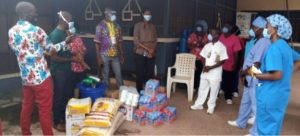Nurses’ contribution to the COVID-19 pandemic in Liberia in 2020
For our final IND 2021 weekly case study and to celebrate International Human Solidarity Day on 20 Dec, we bring you this inspiring report sent to us by the President of the Liberian Nurses Association, David Kollie.

Nurses around the world contributed significantly in the response to the COVID-19 pandemic, including nurses in Liberia. In January 2020, when stakeholders, NGOs and the Ministry of Health in Liberia started hearing about this global pandemic, nurses and health workers in Liberia began to advance their research and knowledge about the pathology, etiology, mode of transmission, preventive and control measures of this infection.
As President of Liberian Nurses Association (LNA), David Kollie immediately engaged leadership teams including the Chief Nursing & Midwifery Officer of Liberia and the Ministry of Health. The LNA secured a budget to immediately start the training of mid-level health workers in the 15 sub-regions of Liberia, before the spread of COVID-19 in the sub-region of West Africa.
This quick impact health workforce project enabled mid-level health workers (registered nurses, registered midwives, certified midwives, physician assistants, laboratory technicians and emergency medical teams) across the country to be on quick alert, educated with a general professional understanding of the case definition, clinical manifestation, prevention and control mechanism of this new COVID -19 disease quickly. This was significant, because the LNA did not want to experience a similar situation to the Ebola virus epidemic during which some health workers engaged with the disease intervention and management with limited knowledge and understanding.
The LNA, in collaboration with the Midwifery Association of Liberia, undertook proactive measures to prepare mid-level health workers in Liberia. The plan was to quickly train the chapter leadership in the various counties as trainers who, in turn, would educate and train their colleagues. This training would mainly focus on the case definition of the coronavirus, specific signs/symptoms, mode of transmission, health risk, prevention, and control measures in respective communities in Liberia. The training proposal intended to support Government response efforts. Unfortunately, the LNA training proposal acceptance was delayed; the virus reached Liberia. As a result, the LNA Leadership lobbied agencies and NGOs to assist in securing PPE and medical supplies to support health workers in facilities in Liberia.
This service provided by the LNA was intended to protect healthcare workers who were preparing to fight against COVID-19. Nurses and other health workers received training, and the LNA also provided masks, faucet buckets and hand sanitizers for most health facilities. Nurses gained knowledge and competencies in managing COVID-19 including working in COVID-19 treatment units in Liberia. Additionally, it gave nurses and other health workers the courage and boldness to face the fight. Most of the nurses and health workers who were infected by COVID-19 survived.
The LNA stressed the importance that the Government provide PPEs, medical supplies and hazard benefits for health workers, including nurses. Future recommendations include:
- The Government should be proactive in providing PPEs, medical supplies, and provide early training for all health workers.
- The Government should allocate a specific budget in case of future outbreak.
- Health related associations and unions should receive compensation to support educating and training respective members in future epidemics.

